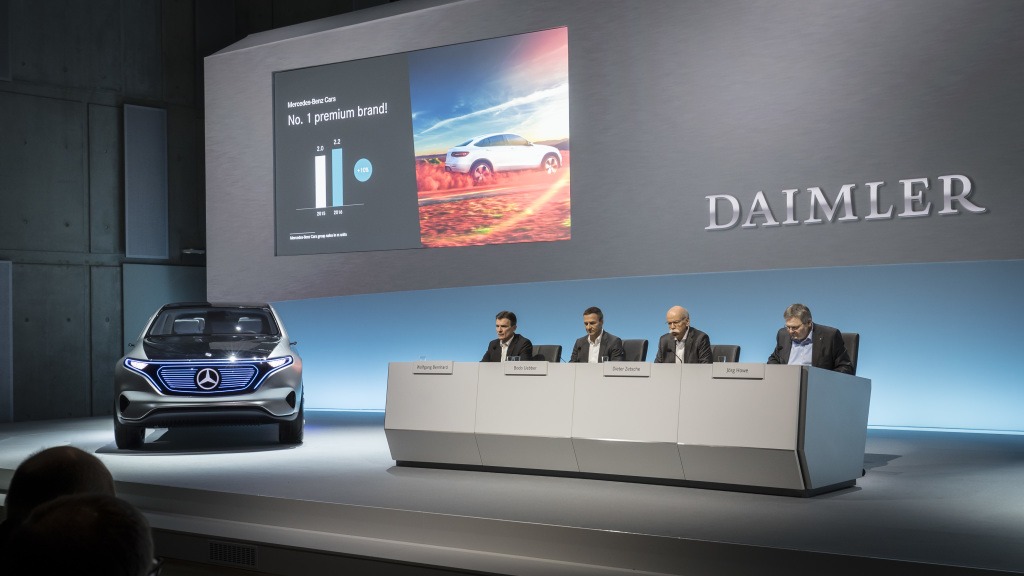Three million Daimler vehicles to be recalled as company fights emissions claims
19 July 2017

19 July 2017
Daimler is to stave off any potential emissions crisis by recalling three million diesel vehicles in Europe and fitting them with new software intended to reduce nitrogen oxide (NOx) levels.
The German company has seen investigations into emissions wrongdoing increase in recent months, and only yesterday (18 July) was forced to announce it would fight any accusations. This came as the magazine Der Spiegel published details of a search warrant issued by prosecutors for a raid on Daimler’s headquarters. It suggested that one million vehicles had been found to have excessive emissions levels, with the belief that they could be fitted with ′defeat devices’ similar to those found in Volkswagen (VW) vehicles.
Daimler has now voluntarily decided to recall three million Euro 5 and Euro 6 vehicles in order to install new software that will reduce levels of pollution, especially NOx which is linked to rising health concerns. The recall decision was made by the vehicle manufacturer and was not imposed by German authorities.
The move will see the company extend an ongoing upgrade of about 250,000 cars and vans to nearly every modern Mercedes diesel on the road. With the recall, Daimler is seeking to head off a growing crisis over potential emissions cheating. If the recall plan is accepted by officials, it could help Daimler avoid the massive penalties that VW saw when it was found to be cheating emissions testing in the US during 2015. Unlike Volkswagen, which admitted it deceived regulators, Daimler says it adhered to regulations that allow vehicles to reduce emissions controls to protect a car’s engine.
In a statement, the company says: ′Since March 2017, Mercedes-Benz has offered its customers of compact-class cars an improvement in NOx emissions for one engine version. Approximately 45% of those cars have meanwhile been updated.
′In order to effectively improve the emissions of additional model series, Daimler has now decided to extend the service action to include over three million Mercedes-Benz vehicles. For this purpose, the company’s engineers are making use of latest knowledge gained during the development of the new family of diesel engines.
′The measures to be taken for nearly all EU5 and EU6 vehicles in Europe will be carried out in close cooperation with the German regulatory authorities. The company is investing about €220 million. The service actions involve no costs for the customers. The implementation of the measures will be starting in the next weeks. Due to the large number of vehicles this will continue over a longer period of time.’
However, unlike Porsche, which is considering dropping its diesel engine line up, Daimler is committed to the fuel.
Dieter Zetsche, Chairman of the Board of Management of Daimler AG and Head of Mercedes-Benz Cars, adds: ′The public debate about diesel engines is creating uncertainty – especially for our customers. We have therefore decided on additional measures to reassure drivers of diesel cars and to strengthen confidence in diesel technology. We are convinced that diesel engines will continue to be a fixed element of the drive-system mix, not least due to their low CO2 emissions.’
As well as the recall, the company has also announced that it will bring forward the introduction of its latest diesel engine, the OM654, to its entire fleet. Currently the variant is only available in the new E Class, launched in 2016.
During July 2017, Daimler’s top executives were summoned for a special meeting with transport executives in Berlin to discuss an ongoing probe into the carmaker’s engines, which in turn came after the German Government said it would expand its examination to include additional vehicle models.
Germany’s motor transport authority (KBA), is also to oversee additional tests on Mercedes vehicles to ensure they do comply with emissions regulations. Germany has found no signs so far that Mercedes-Benz used illegal software to manipulate diesel emissions and the manufacturer has been cooperative with authorities. However, the move to recall three million vehicles can be seen as a way to stave off any potential action, although it does not serve as an admission of guilt.
While it remains committed to diesel, Daimler is also pushing forward with the introduction of its electric vehicle (EV) sub-brand, EQ. The program would see 10 planned EVs to be developed by Mercedes in a €10 billion program launched as part of its CASE strategy.
Photograph courtesy of Daimler